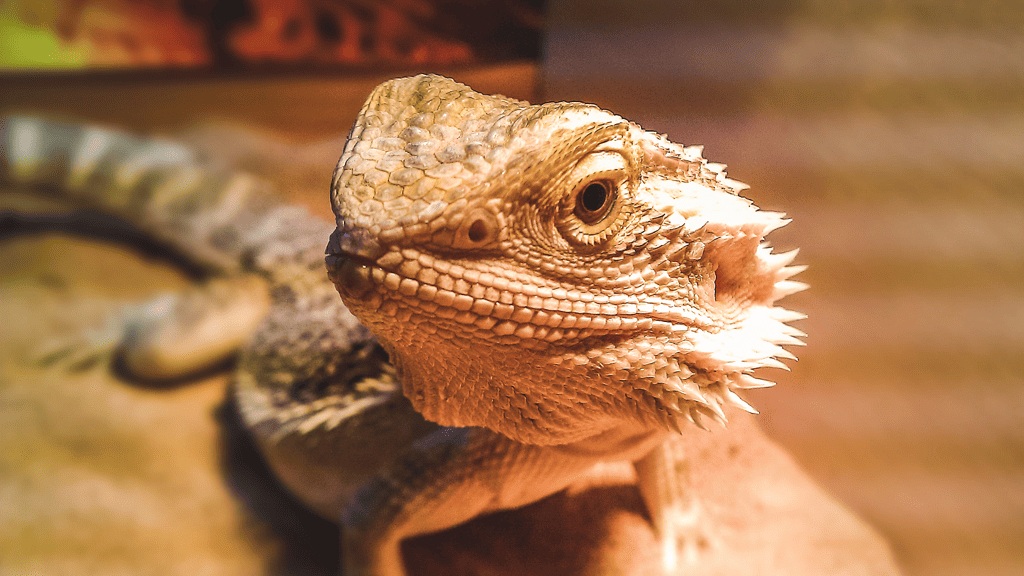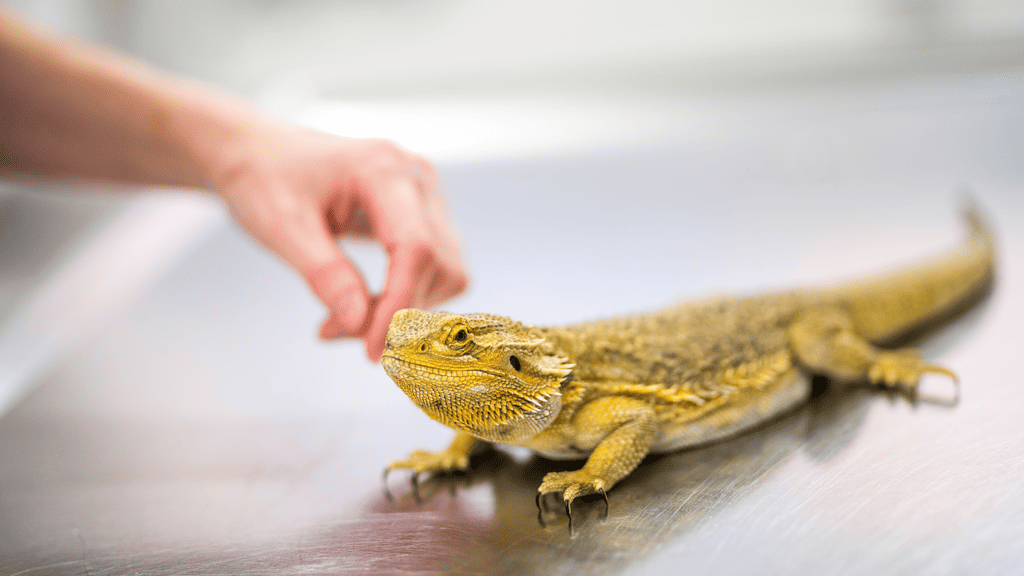Bearded dragons are cute, gentle, and fascinating reptiles. They do some strange and sweet things. The owners love these behaviours and qualities. Particularly in the case where the owner is aware of the significance of these actions. But how do beardies sleep? This is a question that many new bearded dragon owners ask, especially when they see their new pets sleeping upright.
Let’s discuss how bearded dragons sleep.

A beardie is a diurnal species like humans. In nature, they are awake during the day and sleep at night. Bearded dragons have several peculiar sleeping patterns, some of which are charming, but all of them are perfectly healthy. Knowing how your reptile sleeps will help you care for it at its most vulnerable period.
This page will teach you how bearded dragons sleep, as well as where they sleep, how often they sleep, and for how long they sleep.
How Do Bearded Dragons Sleep?
Bearded Dragons sleep in the dark, on their bellies, like us. They can get into positions that we may find strange for several reasons. It can also signify an energy deficiency from inadequate meals, low ambient temperatures owing to the season or a bad heat lamp, or low nocturnal temperatures for the same reason.
Bearded dragons are renowned for their peculiar sleeping habits. These reptiles will frequently sleep on their bellies and in a variety of other postures as well. People have seen these animals sleep standing up in the wild, usually against trees or stems. Bearded dragons kept as pets also fall asleep while leaning against the walls of their cage or other things in their living space.
Covered in Sand
Bearded Dragons bury themselves in the sand before entering a sleeping state. In most cases, this is an entirely normal pattern of behaviour. The vast majority of Beardies occasionally engage in this behaviour, while some do it often.
Very little light should penetrate the tank at night, and you should maintain perfect temperatures inside the tank. Make sure your Beardie isn’t hiding from a dominating tank mate. If every one of those conditions is met, there is no cause for alarm.
Change of Colour
Bearded dragons typically undergo a change in colouration when they are sleeping. This behaviour is a response to the temperature conditions that exist within its cage. They naturally lighten their skin, so it seems pale when they have to cool off, and they darken it to appear darker when they want more warmth.
Bearded dragons often turn completely white or very pale as they sleep. This will help it maintain a more comfortable temperature while resting, allowing it to receive some much-needed relaxation.
Slow Breathing
When sleeping, a bearded dragon may slow down their metabolism and breathe much slower. It may look like they’re not breathing at all when they’re fast asleep. It might be a typical sleeping breathing pattern or a sign of a problem. Check on your bearded dragon carefully and ensure everything is well with it.
Brumation
Some bearded dragons sleep for a while, which is called brumation. This time period can last anywhere from a few days to a few months, and it often takes place in the latter part of fall and into the winter months.
Bearded dragons brumate when nocturnal temperatures are 60 to 70°F. A bearded dragon’s metabolism and respiratory rate drop significantly during brumation. Their respiration may gradually slow down, and they appear to have stopped breathing altogether.
Burying Themselves
It’s possible that right before it goes to sleep, your bearded dragon will begin to wrap itself in the fine substrate in its enclosure. When the substrate is sand, this phenomenon is seen most frequently. If you learn that your bearded dragon engages in this behaviour, you shouldn’t stress out.

When Do Bearded Dragons Sleep?
Bearded dragons, like us, are diurnal, meaning they sleep at night and are awake throughout the day. In their native habitat, they wake up with the sun and sleep when it’s dark. This implies that your beardie should be asleep when you are.
On the other hand, most bearded dragons need more sleep than you. Bearded dragons usually get between 8 and 12 hours of sleep each day. Bearded dragons are nocturnal creatures requiring complete darkness to rest; therefore, their enclosure should be as dark as possible during their designated nap time.
Where Does A Beardie Sleep?
Bearded dragons sleep in different ways and positions depending on where they sleep. Therefore, you may be interested in learning about the best bed for you and your pet.
Bearded dragons always rest in a shady areas when living in their natural habitat. Dens, holes in rocks, fallen logs, loads, holes or hollows in trees, etc., are all excellent examples.
On the other hand, in captivity, bearded dragons preferred to live in cages or vivariums made by humans.
So, be careful when you choose and put up your pet’s shelter. Maintain a warm environment inside the cage while preventing disturbances from entering. In addition to that, it is vital to have specific hiding spots.
Do Bearded Dragons Sleep After Eating?
Bearded Dragons need sunlight to aid in their diet’s digestion. If they did not have the opportunity to bask in the sun, it would be impossible for them to digest their food.
Your Dragon might get sick if you give it its final meal before bedtime and turn out the lights. Bearded Dragons might suffer from a wide range of health issues.
Impaction is one example of such a problem. This happens when food gets stuck in your Dragon’s intestines because it isn’t digesting well, causing it to be constipated.
This could cause Bearded Dragons a lot of pain, irritation, and a loss of appetite. In addition to this, because they are unable to digest food, they will have a nutrient deficiency, which might lead to potential health problems.
Why Do Bearded Dragons Sleep So Long?
Beardies need significant sleep to maintain their health and develop normally. Since wild bearded dragons follow the sun’s natural cycle, captive bearded dragons need to adhere to a regular “bedtime routine.” This is a biological process taken in by most animals, including humans.
Furthermore, this assists your bearded dragon in maintaining an appropriate body temperature when it is outside. When it’s cooler at night, they sleep, and when it’s warmer during the day, they sunbathe so that they have more energy to devote to tasks like finding food.
